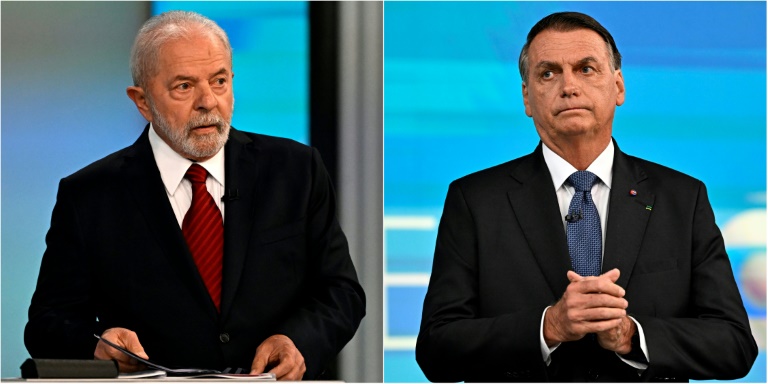Brazil rivals stage final rallies ahead of cliffhanger vote

Leftist Luiz Inacio Lula da Silva (left) remains a hair’s breadth ahead in the polls after a first-round victory, but many see the race against far-right Jair Bolsonaro as too close to call
Rio de Janeiro – Brazil’s presidential candidates will hold their final rallies Saturday in a scramble for votes on the eve of a white-knuckle election that has deeply polarized Latin America’s largest economy.
The charismatic leftist Luiz Inacio Lula da Silva, tarnished by graft allegations, remains a hair’s breadth ahead in the polls after a narrow first-round victory.
But many see the race against far-right incumbent Jair Bolsonaro as too close to call.
The run-off campaign has been a dirty, gloves-off battle for every last vote between two men adored and hated in almost equal measure.
Critical policy issues such as the economy, corruption, and the stricken Amazon have taken a backseat to personal attacks.
Bolsonaro has been accused of “cannibalism” or “pedophilia” over controversial remarks, while Lula has been derided as a “lawless bandit” who has made a pact with Satan.
The rivals held a final mudslinging bout Friday night in their last debate, which featured mutual accusations of lying, corruption and disastrous management.
“Stop lying, Lula,” said Bolsonaro. “Do I have to perform an exorcism on you to get you to stop lying?”
“Brazilians know who the liar is,” Lula fired back.
– Mired in uncertainty –
Bolsonaro outperformed pollsters’ predictions in the first-round vote on October 2 to finish just five points shy of Lula, 48 percent to 43 percent.
Lula now has 53 percent voter support to Bolsonaro’s 47 percent, according to a poll published Thursday by the Datafolha institute, which will release a final poll Saturday night.
Both candidates have gone all-out to win over the five percent of voters who plan to spoil their ballots, and another two percent that are undecided.
The run-off is mired in “uncertainty,” said a statement from the Hold consultancy in Brasilia on Friday.
Despite Lula’s “slight advantage, potential changes in stance by the voter could favor” Bolsonaro, it said. “Abstention rates will also have an influence on the final result.”
On Saturday, Bolsonaro will fire up supporters at a motorcycle rally in Belo Horizonte, the capital of the state with the country’s second-highest population: Minas Gerais.
Both candidates have devoted outsized attention to the state. Since 1989, no president has won an election without a victory in Minas Gerais.
Lula will make his final appearance in Sao Paulo, Brazil’s economic powerhouse, where he got his start as a metalworker at the age of 14 before becoming a unionist.
The dogfight has frayed nerves in the country of 215 million people, which is facing pressing issues including hunger and economic recovery from the Covid pandemic, which left more than 685,000 dead in Brazil.
– Two visions for Brazil –
Bolsonaro, 67, is seeking re-election after a first term in which he was accused of mishandling the pandemic.
His tenure was marked by vitriolic attacks on his perceived rivals, ranging from the judiciary to women and foreign leaders.
Bolsonaro is often dubbed the “Tropical Trump”, in reference to the equally divisive former US leader who on Friday called on Brazil to vote for “one of the great presidents of any country in the world.”
In campaign ads, Bolsonaro apologized for his occasional “slightly aggressive” tone, and he has boasted of reduced crime rates, a drop in unemployment figures, and curbed inflation.
His hardline conservative fans love his focus on “God, country, family and freedom.”
Lula, Brazil’s president from 2003 to 2010, is seeking a spectacular comeback, telling voters they are choosing between “democracy and barbarism, between peace and war.”
He was the country’s most popular president when he left office, helping to lift millions out of poverty with his social welfare programs.
But he then became mired in a massive corruption scandal and was jailed for 18 months before his convictions were thrown out last year. The Supreme Court found the lead judge was biased, but Lula was never exonerated.
Both candidates have fervent support, but many of Brazil’s 156 million voters will merely vote for the candidate they least detest — or spoil their ballots.
“It’s not about the political agenda that I usually identify with. I am prioritizing getting rid of one candidate rather than electing another,” Rio de Janeiro artist Karla Koehler, 35, told AFP.
